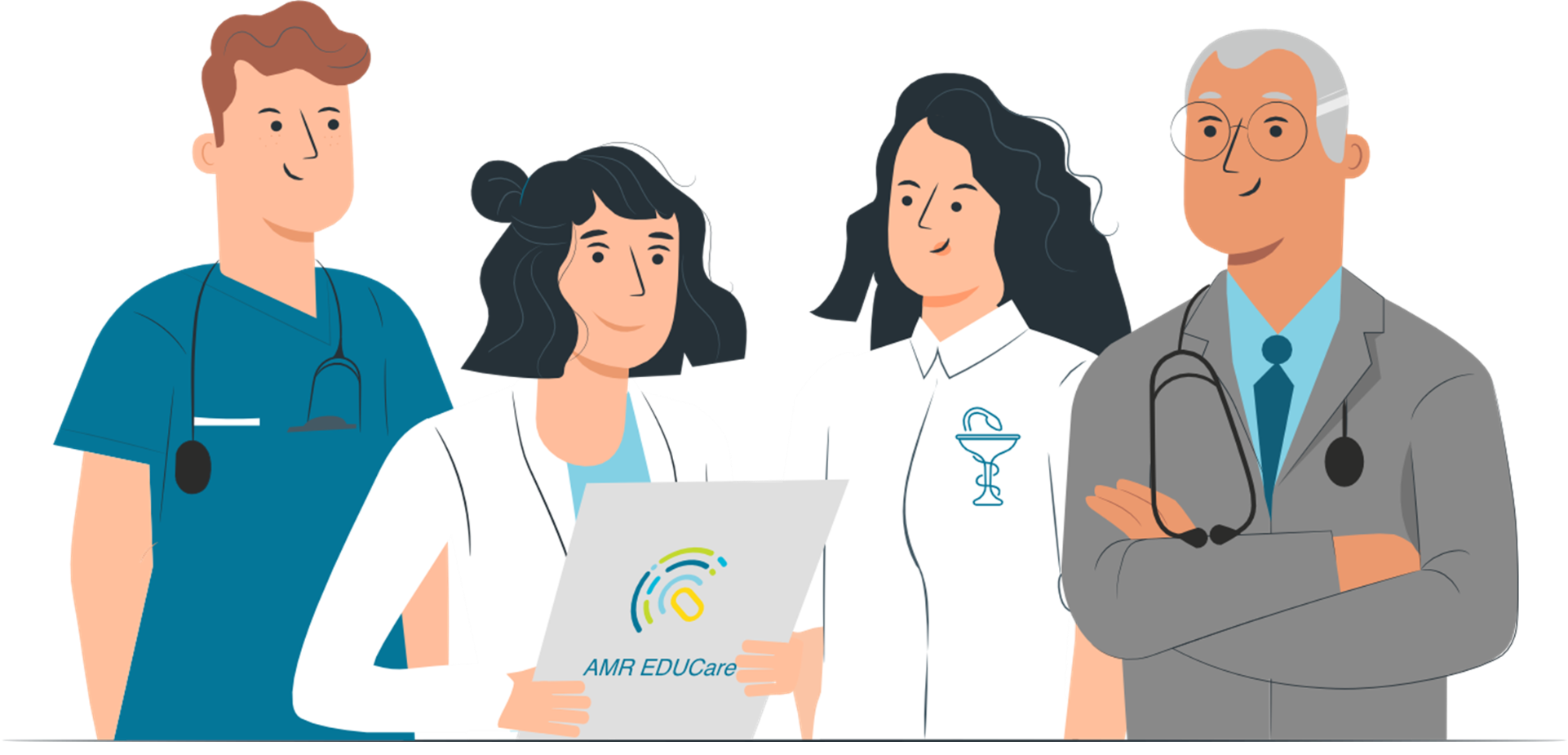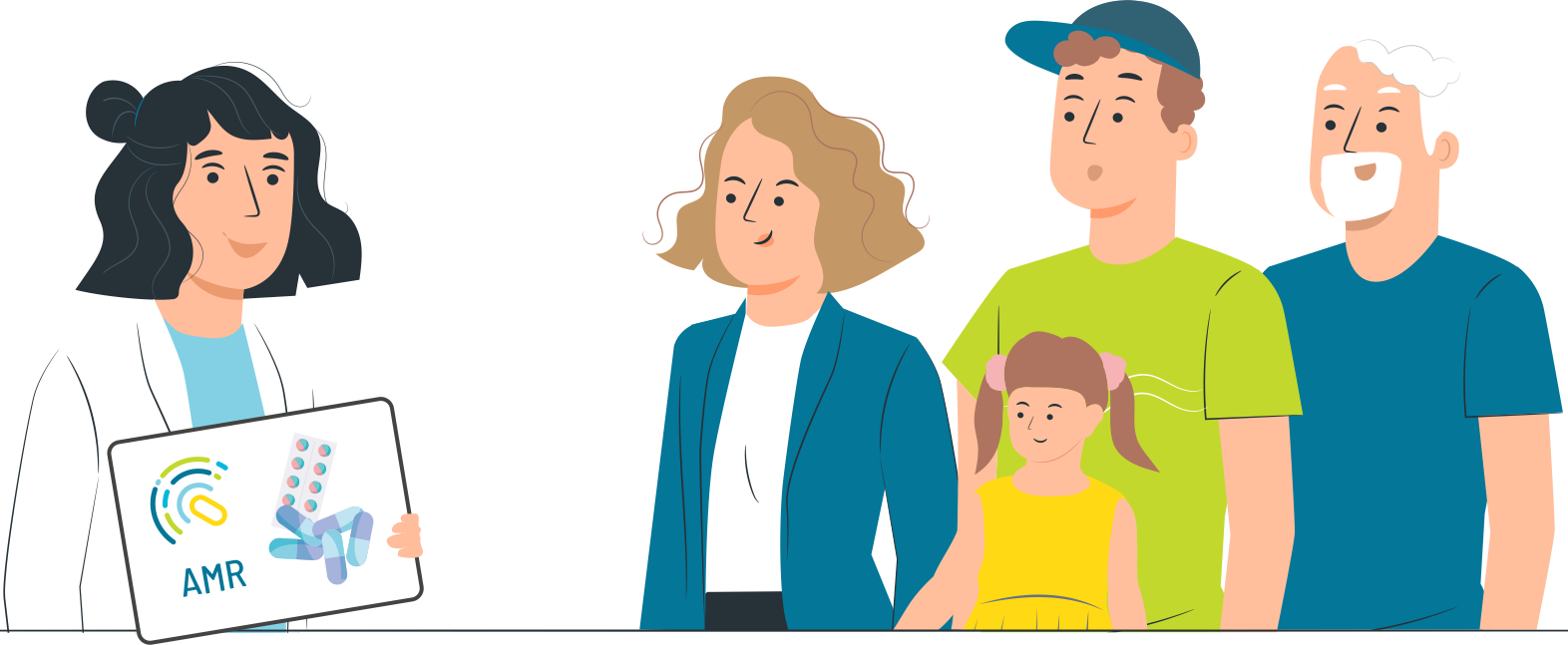Welcome to the third AMR EDUCare newsletter
June, 2024
Dear Reader,
We are happy to present the third newsletter of the AMR EDUCare project (2023-2025), committed to the fight against antimicrobial resistance (AMR) by developing educational materials in this field for healthcare professionals.
In this newsletter, we provide insight into the courses that are currently under editing on the online learning platform:
─► optimising antimicrobial prescribing
─► reducing and managing antimicrobial waste
─► empowering patients through effective communication
Antimicrobial Prescribing Optimisation
The course on Antimicrobial Prescribing Optimisation is designed to meet the unique educational needs of doctors, pharmacists, nurses, and healthcare managers, providing each group with the specialized knowledge and tools necessary to combat AMR effectively.
The training modules for doctors and pharmacists deal in detail with antimicrobial resistance and antibiotics and different infections, such as respiratory, urinary, skin and soft tissue infections, with a separate module on pediatric cases. In addition, the interpretation of microbiological results and the role of doctors and pharmacists in antimicrobial stewardship are emphasized.
Nurses’ role is crucial in the fight against AMR, as they are in a unique position to provide health education and promotion aimed at preventing infectious diseases. They represent one of the patient’s first and most frequent contacts within the healthcare system, making the nurse-patient relationship one of the most direct and common. The course’s module for nurses focuses on their multifaceted role: their responsibilities and contributions to preventing and controlling infections, diagnosing and treating infections, and appropriately using antibiotics.

Primary care managers play a strategic role in improving the use of antimicrobials. The course’s module for managers focuses on objectives like recognizing the proper use of antimicrobials as a key tool in the fight against AMR and establishing this goal as a priority across all health centres and among all healthcare professionals. Managers must also ensure the provision of the necessary technical and human resources to support these efforts and include incentive schemes to encourage compliance.
Antimicrobial Waste Reduction and Management
Europe accounts for 5% of the global population, which consumes around 24% of the pharmaceutical products sold globally. This produces considerable amounts of waste that end up in the environment, including antibiotic residues, that can lead to the development and acceleration of antimicrobial-resistant pathogens. Therefore, waste minimisation and management is a key component of the training of a healthcare professional.
Integrating a ‘One Health’ approach, which highlights the interconnectedness of human, animal, and environmental health is essential for healthcare professionals to understand the impact of antibiotic waste in the environment and minimise the acceleration of AMR. The course will guide you on how to incorporate this approach into your daily healthcare practices. Pharmacists will learn about the implications of dispensing larger volumes of medication than necessary, while doctors can explore the benefits of choosing reusable surgical devices over single-use ones. Nurses, supply managers, hospital managers, and cleaners will find specific guidance on how their decisions impact waste generation and management.

Knowing the crucial stages of the waste hierarchy, understanding how to segregate waste and how to apply a colour coding system, or learning how to use digital tools to create a ‘First in, first out’ system, are some of the practical skills that healthcare professionals will gain when taking this module.
Patient Empowerment through Effective Communication
Effective communication is a cornerstone of successful healthcare delivery, particularly in promoting the responsible use of antibiotics. This online course on enhancing communication skills is designed to equip healthcare professionals with the knowledge and skills needed to support patients and their networks across different age groups, ensuring a comprehensive understanding of the appropriate use of antibiotics and the potential impacts of antibiotic misuse.

Young adults transitioning from paediatric to adult care face unique health concerns, such as sexual and reproductive health, mental health, and substance abuse. In addition to the support provided in these areas, they also need help to understand the long-term impacts of health issues like antimicrobial resistance (AMR). This demographic group often has shorter attention spans and relies heavily on social media for information. Healthcare professionals are to develop effective communication skills that are respectful, informative, and culturally sensitive. Engaging young adults through digital resources—such as websites, apps, and social media platforms—can promote their health literacy on AMR.
Among society, we also focus on the general public and legal guardians, who play a crucial role in healthcare decisions regarding children. Effective communication with this group is essential as they are the generation that is educating a new generation to come.
Barriers such as time constraints and complex medical terminology can challenge effective communication. Addressing these barriers requires healthcare professionals to use clear, simple language and take the time to ensure patients fully understand their diagnoses and treatment plans.
Elderly patients can represent a vulnerable population with specific health needs, including multiple chronic conditions and the use of various medications. Communicating with elderly patients can be challenging due to age-related issues (cognitive issues, dependency, social isolation, etc). Therefore, healthcare professionals must follow specific strategies to communicate effectively with these patients. These include, among other things, clear speech, visual aids, solving health concerns and setting up a stable network among other HCPs and carers the patients may have.
Thank you for reading our newsletter! Stay tuned for more updates about our project, and be the first to know when our courses become available. If you found this information valuable, please recommend our project to your colleagues and friends in the healthcare industry.
Thank you for staying with us,
Best wishes from the communications team:

Szilvia Farkas

Albert Aszalos

Szilvia Farkas

Albert Aszalos
Subscribe to our newsletter to stay informed about course development and availability

Funded by the European Union. Views and opinions expressed are however those of the author(s) only and do not necessarily reflect those of the European Union or the Health and Digital Executive Agency (HaDEA). Neither the European Union nor the granting authority can be held responsible for them.
